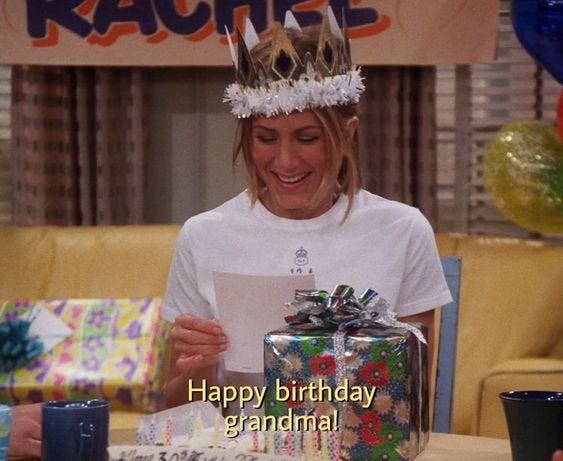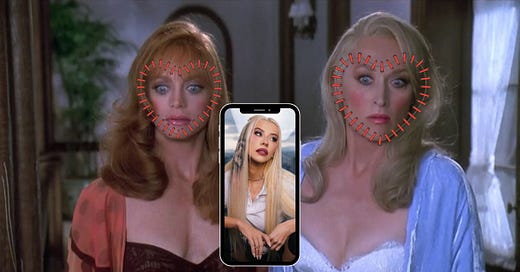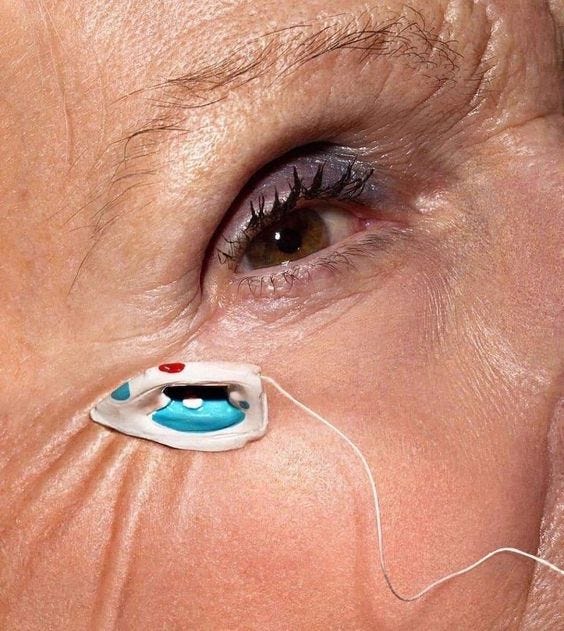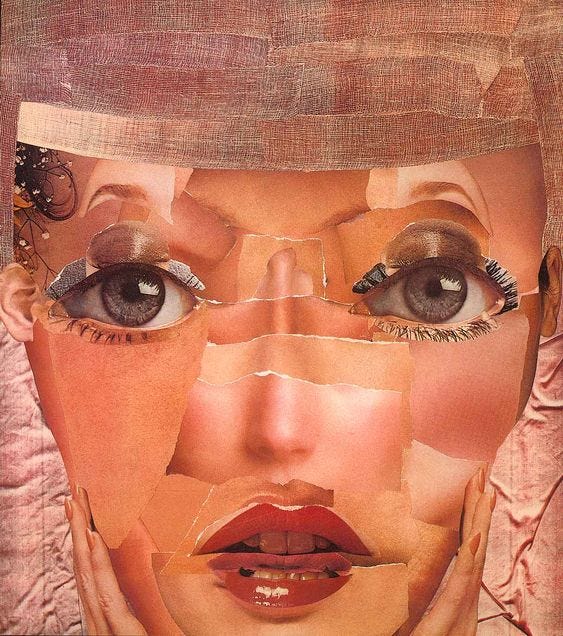A few months ago, during one of my routine cultural research sessions (aka scrolling on TikTok), I came across a creator talking about Christina Aguilera’s comeback at 42. They were discussing how incredible she looked after some cosmetic work—better than ever, and supposedly undetectable (I’m paraphrasing here because, silly me, I didn't save the TikTok and now can’t find it for the life of me). Frustratingly, the creator didn’t satisfy my lazy expectation of showing the photos, so I had to, sigh, exit TikTok, sigh again, and head to Google to find recent pictures of the woman who invented sexy in the noughties, final sigh.
Let me be clear: I’m not criticising Christina Aguilera—she looks stunning! But she doesn’t look like herself. She’s completely transformed, and while she may appear 22 again, I can definitely tell she’s had work done. In fact, I don’t think I’d recognize her if she walked by, unless suddenly the words “He met Marmalade down in old Moulin Rouge” came out of her mouth in the beautiful, nostalgic melody of Lady Marmalade. THEN I’d know it was her! (Also, if you didn’t read the aforementioned lyrics by singing them in your head, please go back and do so.)
We live in an era where beauty is more visible and, paradoxically, more invisible than ever before. Online, we’re bombarded with faces that seem to defy the passage of time—celebrities and influencers posting photos that look mysteriously (and slightly eerily) untouched by age. As digital filters smooth out every line, and algorithms favour youthfulness, the expectation of beauty is evolving—no, mutating—into something surreal: the undetectable era of beauty, where even the work done to stay youthful is invisible.
Social media, originally a tool for connection, now feels like a magnifying glass of expectations, prescribing not only how we should look, but how we should age. Or, more accurately, how we should avoid ageing. It feels as if we were living in an irony: in a time where body positivity and self-acceptance have supposedly become mainstream mantras (although it feels like in the last couple of years we’ve actually been taking major steps BACK, but that’s a story for another day…), society’s obsession with youthful perfection has never been more present. To be seen, to be valued as a woman, you must remain as if frozen in time.
The Undetectable Era of Beauty
I remember being pretty young when I first started to pick up the signs of a face that had undergone cosmetic surgery—facial features would warp a little, lips would swell beyond plump, and there was always that unmistakable tightness to the face. I first started recognising it on magazines or TV and later on the face of some of my friend’s mums. Today though, I’m constantly doubting my eyes (and my mind) when I see a celebrity: a part of me thinks “Something has changed on this face” but then I cannot work out if anything has actually been altered or “they just grew up” or “lost weight”.
We’re entering an era in which beauty has to be both flawless and undetectable. Plastic surgeons and aesthetic experts aren’t just striving for a little bit here and a little bit there, they’re after a paradigm: dramatic, transformative results that no one can actually see. You’re supposed to look like yourself, but a version of you from 10, even 20 years ago which was never touched by the reality of time. It’s like we’ve all become participants in a strange digital pageant, where everyone is parading their devil-owned-soul of an untouched beauty, it sounds straight out of a Black Mirror episode, I know… But we’re seeing it all over our three screens.
Christina Aguilera is just one example—her transformation looks ageless, smooth, and near-perfect. You know something has been done, but you can’t workout what and that’s exactly the point. And this is what’s being sold to women and girls through our shiny little scroll machines—be forever young, just don’t let anyone know how you managed to do it. This contradiction surrounding female beauty is not an idea I came up with: as cultural theorist Susan Bordo has pointed out, women are constantly told to remain in control of themselves, to be effortlessly beautiful, but simultaneously expected to act as if they’re not trying. It’s the paradox of modern femininity – society demands perfection but insists on the illusion that it’s all "natural", leaving women trapped in an endless cycle of concealment, control, and self-surveillance.
Kindly Yours, For Women, By Men
Of course, this pressure is placed on women to a greater extent. It’s no secret that society binds female worth directly to appearance, and even more so to youthful beauty, especially more recently. Men, on the other hand, are not only allowed to age, but are also encouraged. Brad Pitt is a “silver fox” with his wrinkles and grey hairs, but Julia Roberts is “ageing terribly”. Wrinkles in men are a sign of wisdom, they’re seasoned and mature, but for women, there’s an expiration date, a visible, yet invisible line that once crossed, strips us of our beauty, leaving us powerless, and raided of social worth.

As we reach our thirties, forties, and beyond, the pressure builds, we can all feel it. Social media algorithms flood our feeds with images of impossibly young faces, feeding us the lie that beauty only belongs to the young—or at least to those who can mimic youth flawlessly. There’s no room for wrinkles, no space for the passing of time as physical witness to women’s lived lives. We are subtly (and sometimes not-so-subtly) being encouraged to erase every sign of age, not just because ageing isn’t attractive, but because it’s almost unthinkable or unforgivable.
This is all happening at a time when conversations about empowerment and agency are supposedly at the forefront of culture. And yet, the pursuit of eternal youth, especially online, feels like the antithesis of empowerment. It suggests that no matter what we achieve or how far we think we have progressed, beauty—and more specifically, youthful beauty—is still the ultimate currency and should be a woman’s biggest aspiration.
The Skincare Race: Growing Up Too Fast
As the digital world grows obsessed with youth and beauty, a troubling trend has emerged at the core of TikTok—girls barely into their teens (sometimes even younger) are getting swept up into the world of anti-aging skincare. It’s not just influencers doing the influencing anymore; social media platforms themselves push these young girls to worry about “low collagen production” and fine lines before they even have a single breakout. And, let’s be real—I don’t think half of us even know what collagen really does (guilty as charged), yet here’s TikTok, filled with pre-teen girls sharing “How I slow down the ageing process at 14” routines featuring retinol, Vitamin C, and, for some reason, two apple cider vinegar capsules.
 Tiktok failed to load.
Tiktok failed to load.Enable 3rd party cookies or use another browser
I remember when a teenager’s skincare routine was as simple as a face wash and sunscreen—maybe an occasional spot treatment. That was it. And I’m not suggesting we never update those routines, but today, it’s become normal to see 13- and 14-year-olds spending their allowance on retinol creams, anti-ageing serums, and collagen treatments (all products originally meant for women decades older). Brands claim it’s about “prevention” or “self-care,” but I think we all know that most brand’s intentions aren’t especially altruistic.
The sad reality is, this obviously isn’t their fault; they’re simply growing up in a world that treats ageing like a disease and is hyper obsessed with looks. The beauty industry has always thrived on fear, but now, that fear has reached all the way down to girls who are just learning what “moisturiser” is and are at their most vulnerable. Through online tutorials and relentless Instagram ads, they’re being conditioned to believe that ageing is something to fight before it even begins! And the worst part is that a lot of this infliction comes from AI-filtered, poreless, flawless faces, through a kind of “perfection” that doesn’t actually exist, often on people who are exactly their age.
By diving into anti-aging skincare in their early teens, these girls are not only harming their sensitive skin which doesn’t need all these “fixes”, but are also internalising a message that women have been fighting for years: that they must constantly work to “fix” their natural selves just to avoid the fate society dreads most in women: visible ageing. And as they start down this road earlier and earlier, it begs the question: How will this premature focus on preventing ageing shape their self-worth as they actually start to age? I fear for this generation of young girls and I’m not looking forward to keeping track of this through the years.
Is This Really Empowerment?
We’ve been told that embracing our beauty and “choosing” how we feel beautiful and what we decide to do with our bodies/faces is empowerment, feminism, but if this relentless push toward youth keeps women in a constant state of scrutiny and self-harm, is it really? Social media has given us the tools to reshape how we see ourselves, but has it truly liberated us, or has it simply given us a new kind of cage? This is where postfeminism offers a sharp critique—modern beauty ideals are packaged as empowerment, yet they often perpetuate the same forms of control we’ve been fighting against for decades.
Angela McRobbie’s work on postfeminism reveals how these ideals are presented as 'choices' women make, as though opting into heroin-chic and cosmetic enhancement is the ultimate form of self-expression. But is it really a choice when societal pressures make the alternatives, ageing naturally or rebelling against beauty standards altogether, feel like radical acts of defiance? When every swipe, every anti-ageing serum, and every red carpet subtly reinforces that youth equals worth, when going along with it, are we complying with a new, impossible standard? A standard that demands that we remain in control of our appearance at all times, not just to meet the expectations of others but to maintain our own self-worth?
As we navigate this undetectable era of beauty, the question becomes: where do we draw the line? How do we embrace technological and medical advancements in beauty for our freedom, without becoming enslaved to the ideals they impose on us? Postfeminist rhetoric tells us we are empowered by these options, but in reality, could they actually often serve as more sophisticated forms of control? In a world that values youth above all, how do we reclaim the right to age with grace and without apology?
After all, beauty should be expansive, not restrictive; something that grows with us, not something we chase in order to stay still. But the constant pressure to remain ageless suggests otherwise, subtly reminding us that as women, our worth is still tied to how well we can resist the passage of time, even if we’re pretending we aren’t trying at all.









